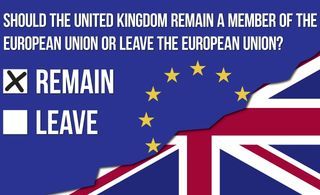Why I have voted 'Remain' -- or 'STAY, UK' as I prefer to call it.
It wont be much of a surprise that I am in the 'Remain' camp, or 'Stay' as I prefer to call it. 'Stay' sounds much more urgent, welcoming and like real speech, than the rather pompous 'Remain' (and 'STAY, UK' would have been a nice rhyming brand). In fact, I have already voted that way; and, although I think there is some mechanism to accommodate postal voters' change of heart, for me it's a fait accompli.
It's not that I think everything is rosy in the EU garden. I have already moaned a bit about the democratic deficit and about how we ought to be concentrating on finding allies within the union to face that; getting rid of the party list system in elections might be a good first step. And I accept that (leaving aside the social legislation that we might have got round to, anyway, in our own time) the 'haves' in the UK have done better out of the EU than the 'have nots'; or rather they feel they have, which is just as important. People in universities, for example, celebrate the exchange of students and expertise, and the funding that comes with the European project, much more than people on what's left of the factory floor.
But that objection doesn't weigh very powerfully with me. After all, it���s part of the very definition of ���haves��� that they are the ones to do better out of whatever system they are in. And it is a pernicious fantasy to suggest that that would be different in a Brexit Britain; quite the reverse, I suspect.
My gut reasons for wanting to stay have ���remained��� the same through much of the last few months. Some of those are, unashamedly, emotional. Thanks to being part of a common enterprise for several decades now, I have come to feel European as well as British as well as English (the Romans, may I say, were very committed to that kind of 'multiple identity politics'). My intellectual world has expanded dramatically thanks to Europe (not wholly caused, but massively assisted, by the EU). And I value being part of a European Union that has the potential to face the big problems of the world, from migration to pollution, that nation states cannot possibly do effectively on their own. Whatever my frustrations with the organisation, turning my back on it (rather than working to improve it) seems as irresponsible as suggesting that Cambridge should opt out of the UK because some of us don���t like what the government is up to.
But over the campaign, my views have hardened for a variety of reasons. These are just some of them... I could give you plenty of others.
I accept that both sides have massaged figures and facts in their favour, but Brexit has been guilty of far worse whoppers and worse strategic silences. I simply cannot stomach the idea that the entirely erroneous figure of ��350 million per week can still be trotted out by the Brexit side, without any sense of shame, despite all the clear and authoritative statements that it is seriously untrue, And that���s not counting the silly little myth-oids about how the EU is making it illegal for the under-8s to blow up balloons, or is regulating against you buying big bunches of bananas. Just read this, taken from that great programme 'More or Less', if you want your eyes opened on the supposed European Cabbage directive.
There would, of course, be a funny side to these stories, if they weren���t so insidious.
And I am fed up too with not having any idea of what Brexit actually has in mind for post-Brexit Britain. Why do they imagine that we will be let back into some free trade zone without accepting the principle of free movement of labour? That, after all, is what Norway et al have to do in order to qualify for a free trade agreement. And what about these Europeans already here? I have heard tell that they will not be thrown out or asked to apply for visas. But what are the mechanisms going to be for deciding who qualifies?
And the final issue for me is the Brexit propaganda of little England and fear of foreigners. They repeatedly accuse ���Remain��� of peddling fear (largely in the economic sector, and sometimes I accept rather foolishly), but they themselves even more dangerously whip up the fear of our green and pleasant land being invaded by thousands of Turkish criminals. Ridiculous as that claim is in itself, we anyway have ��� like every member state ��� a veto on the entry of any new country. Remember De Gaulle���s ���Non���, folks? If Turkey were to come up formally for membership of the EU (and they are decades and decades off that), we could say 'Non' too, if we thought it was so very dangerous.
And their idea of sovereignty is one that would not pass muster in an A��� level ���Politics��� class. Sovereignty doesn���t mean the freedom to do what the hell you want. That freedom is always negotiated and to some extent curtailed by treaties and unions and bilateral agreements. NATO and the UN already curtail it, to the benefit of the whole world. Sovereignty exists within those honourable limits. As John Major said on the Today programme a few weeks ago, if you want sovereignty in the Brexit ('we want our country back') sense, try North Korea.
These arguments remind me of another, ostensibly very different, debate a few months ago. It was a great and fun occasion organised by Intelligence Squared (partly as a benefit gig for ���Classics for All���) ��� a debate between Boris Johnson and me on whether ancient Greece or ancient Rome was the ���better��� culture. You can watch it here.
It's maybe a bit unfair of me to say so, as Boris was such a good sport about the whole thing -- but what strikes me in retrospect is how similar some aspects of that stand-off were (even if obviously less serious) to what we are experiencing now. He was very funny, hugely engaging and a far more skilled orator than I was; you can't help being a bit impressed. But he was also extremely economical with the truth. His ���Greece��� came down just to one city at one period (fifth and fourth century BC Athens). Did any of his arguments about the Greek virtues of democracy and freedom apply to Sparta or Thebes? No they jolly well didn���t. And sometime he was plain wrong. You can tell about the power of human talent in Greece, he said, by looking at the Parthenon frieze: the gods and the humans on it are all the same size. No they are not. They take up the same size on the frieze but the gods are SITTING DOWN (if they chose to stand up, they���d be twice as big as the mortals). Not to mention that his eulogy of freedom of speech in classical Athens seemed to have forgotten what happened to Socrates.
My own contribution certainly bigged the Romans up, while lavishly celebrating the virtues they showed which are so easily, and so often, forgotten (such as a radically liberal definition of citizenship). But part of my case rested on the fact that the Romans -- like the EU, though I didn���t say or think it at the time -- were messy and flawed; but that they were also recognisably real and recognisably 'us', warts and all.
To my surprise, I won (just). I like to think that it was a combination of realism, practical politics and the facts triumphing at the final vote. And I hope that the same great British good sense (and the same British ability to sniff out a whopper) will come good on 23 June.
So, as I like to put it: please vote ���STAY, UK���.
Mary Beard's Blog
- Mary Beard's profile
- 4070 followers





